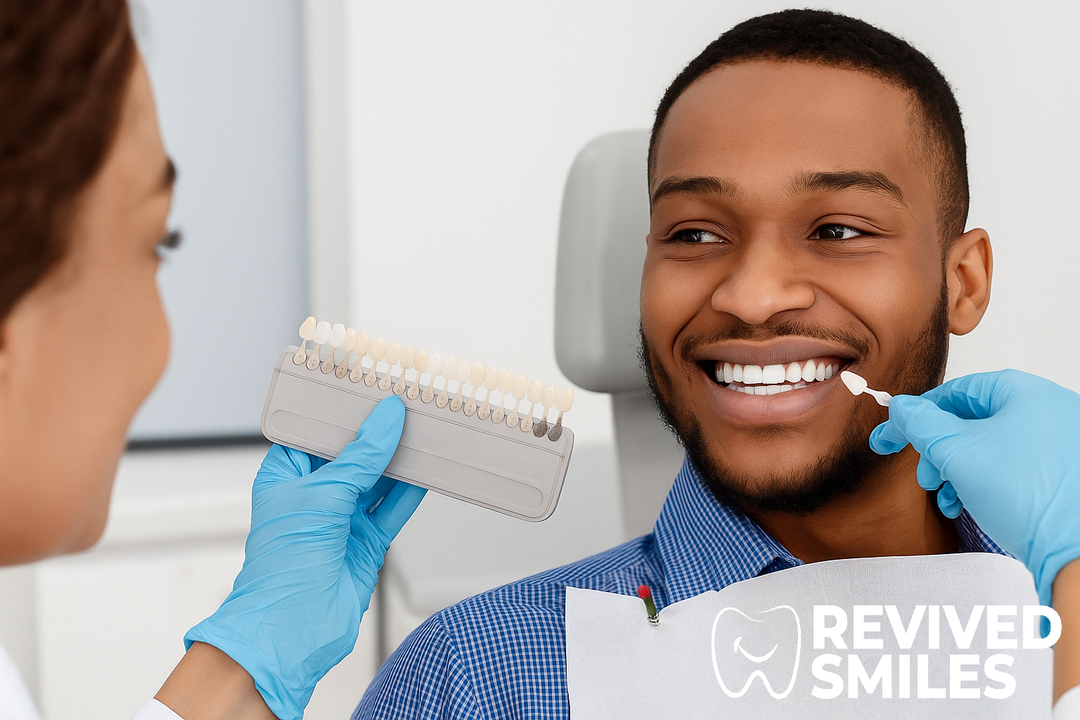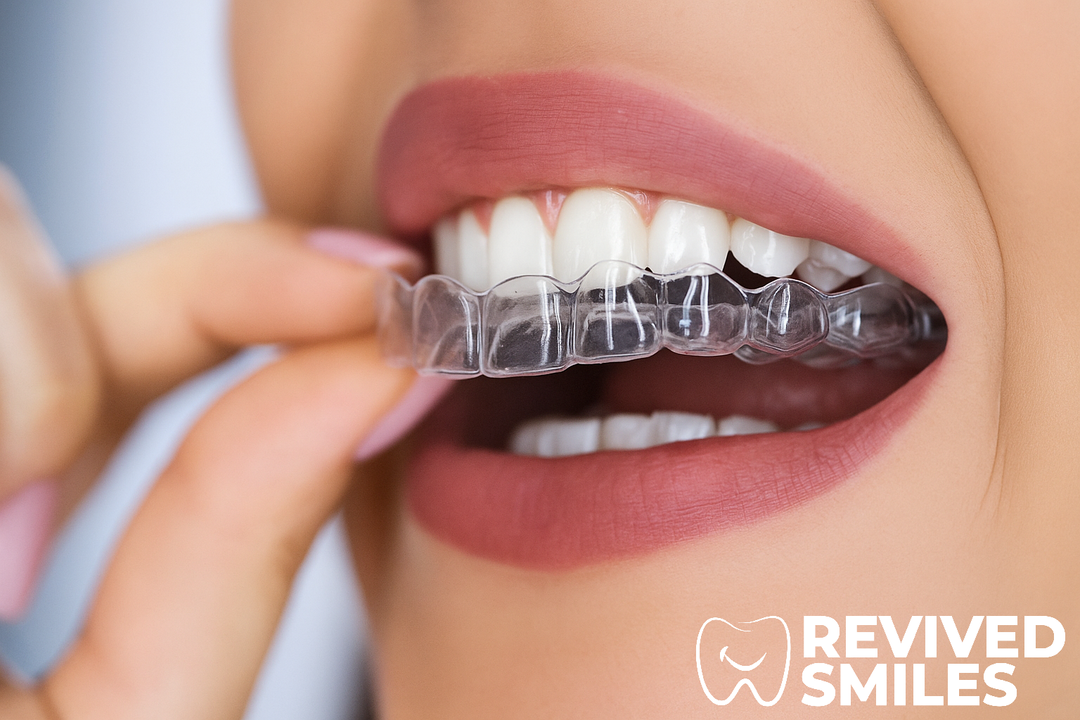¿Puede usted comer normalmente con prótesis parciales?

Pocas cosas brindan tanto consuelo como sentarse a disfrutar de una comida favorita. Pero para cualquiera que se esté adaptando a una nueva prótesis dental, la pregunta a menudo persiste: ¿Se puede comer con normalidad con prótesis parciales? La preocupación es completamente natural. La comida es social, emocional y personal, por lo que la idea de perder esa simple alegría puede resultar abrumadora. ¿La verdad tranquilizadora? Con un poco de paciencia, práctica y los consejos adecuados, comer con prótesis parciales puede volverse tan placentero como antes.
¿Qué son las dentaduras postizas parciales?
Una prótesis parcial es un reemplazo hecho a medida que rellena los espacios donde antes faltaban dientes. A diferencia de las prótesis dentales completas, se integran con los dientes naturales, utilizándolos como soporte y estabilidad. Su objetivo principal es simple: restaurar la capacidad de masticar, proteger los dientes restantes y devolverle la confianza de una sonrisa de aspecto natural.
Vienen en diferentes materiales, acrílico tradicional, estructuras metálicas o diseños flexibles más nuevos como Valplast, TCS y DuraFlex.
Las prótesis flexibles , en particular, se sienten más ligeras y se adaptan con mayor comodidad a la boca. Esto las hace especialmente populares entre quienes se preocupan por la sensación al comer.
En definitiva, las prótesis parciales no solo cambian tu sonrisa. Cambian tu forma de vivir la comida, las conversaciones y la vida cotidiana.
El período de ajuste: ¿cuánto tiempo dura?
Es importante ser realista: sus primeros días con la nueva prótesis dental serán diferentes. Su boca necesita tiempo para "aprender" esta nueva adición, al igual que los músculos de la mandíbula.
La mayoría de las personas notan que el período de adaptación toma algunas semanas. Al principio, podría notar que su dentadura postiza se mueve ligeramente, que su boca produce más saliva de lo habitual o que tiene algunas molestias. Todo esto es normal.
Piensa en ello como estrenar un par de zapatos. Al principio, te resultarán desconocidos, pero pronto se convertirán en parte de tu rutina diaria. Con la práctica, recuperarás la confianza y volverás a disfrutar de tus comidas favoritas.
Desafíos comunes con las dentaduras postizas nuevas
Usar una dentadura postiza nueva puede ser un gran cambio, especialmente a la hora de comer. Durante el periodo de adaptación, es normal notar que ciertos alimentos son más difíciles de digerir. Los alimentos masticables, como el bistec o los cortes duros de carne, pueden requerir más esfuerzo para morderlos y pueden resultar incómodos al principio. Los alimentos pegajosos, como el caramelo o la mantequilla de cacahuete, pueden adherirse a la dentadura postiza, lo que aumenta el riesgo de que se desprendan o causen molestias. Los alimentos duros, como las verduras crudas, los frutos secos o los snacks crujientes, pueden ejercer presión adicional sobre la dentadura postiza y las encías, haciendo que comer sea menos placentero.
También es común sentirse inseguro al morder y masticar con su nueva dentadura postiza. Quizás necesite masticar despacio y cortar la comida en trozos más pequeños para comer con más facilidad y reducir la presión sobre las encías.
Estos desafíos son parte normal del proceso de adaptación de la boca a la nueva prótesis. Con el tiempo y la práctica, estas dificultades desaparecerán y comer volverá a sentirse más natural.
Comer con prótesis parciales por primera vez
Las primeras comidas con prótesis parciales marcan la pauta. En lugar de forzarse a comer ciertos alimentos de inmediato, ayuda a evitar las prisas.
Empiece con alimentos blandos como puré de papas, huevos revueltos, pescado o yogur. Estas opciones no solo son suaves para las encías, sino que también sacian y nutren, lo que las hace ideales para la transición mientras se adapta a comer con dentadura postiza .
A medida que te sientas más cómodo, prueba gradualmente con alimentos un poco más firmes. Cortar la comida en trozos pequeños facilita la masticación y reduce la presión. Cada paso te dará confianza y reentrenará tu mordida.
Alimentos que puedes comer cómodamente
Una vez que sienta que su dentadura postiza es parte de usted, el menú se amplía. Muchos alimentos son aptos para dentaduras postizas y puede disfrutarlos sin preocupaciones.
A continuación se presentan algunas opciones seguras y satisfactorias:
-
Frutas blandas como plátanos, melocotones o peras maduras.
-
Verduras cocidas como calabaza, brócoli o zanahorias.
-
Alimentos básicos ricos en proteínas, como pescado, pollo, frijoles y huevos.
-
Productos lácteos favoritos, incluidos queso y yogur.
-
Granos fáciles como arroz, pasta o avena.
-
Líquidos nutritivos como sopas, caldos o batidos, que son especialmente fáciles de consumir durante el período de adaptación inicial.
Estos alimentos no sólo son suaves, sino que también aportan la nutrición necesaria para la salud de las encías, la salud bucal y el bienestar general.
Alimentos que se deben evitar con prótesis parciales
Dicho esto, hay ciertos alimentos que pueden causar problemas. Algunos son demasiado pegajosos, otros demasiado duros y otros demasiado masticables.
Esto es lo que hay que tener en cuenta:
-
Alimentos pegajosos como caramelo, chicle o caramelo masticable.
-
Alimentos duros como nueces, granos de palomitas de maíz o caramelos duros.
-
Panes duros con corteza gruesa o bagels.
-
Alimentos masticables como filetes o costillas.
No es necesario evitar los objetos pegajosos o duros para siempre. Pero tenerlos en cuenta, sobre todo durante las primeras semanas, te ahorrará frustraciones innecesarias y mayor presión en las encías.
Consejos prácticos para comer con comodidad
Adaptarse a las dentaduras postizas no se trata solo de lo que comes, sino también de cómo lo haces. Unos pequeños hábitos pueden marcar una gran diferencia.
-
Corte los alimentos en trozos pequeños o incluso más pequeños cuando sea necesario.
-
Mastique lentamente y utilice ambos lados de la boca al mismo tiempo para distribuir la presión.
-
Evite morder directamente alimentos crujientes como manzanas o mazorcas de maíz, córtelos en rodajas.
-
Tenga a mano un vaso de agua para ayudar a digerir los alimentos y mantener la boca cómoda.
Estos consejos pueden resultar incómodos al principio, pero rápidamente se convertirán en algo natural. En poco tiempo, te darás cuenta de que comes con más confianza sin siquiera pensarlo.
Eficiencia masticatoria con prótesis parciales
Cabe destacar que masticar con prótesis parciales no se siente igual que hacerlo con dientes naturales. La fuerza y la sensación de control pueden ser ligeramente diferentes.
Pero con la práctica, puedes recuperar la mayor parte de tu eficiencia masticatoria. El secreto está en el equilibrio: distribuir la comida uniformemente en ambos lados de la boca para que tu dentadura postiza se mantenga estable y no se sienta floja.
Si usa dentaduras postizas hechas con materiales flexibles, es posible que note que se adaptan mejor a su mordida, lo que hace que el proceso sea más suave.
Prótesis parciales flexibles y alimentación
Si comer cómodamente es su principal preocupación, las prótesis parciales flexibles suelen ser una excelente opción. Fabricadas con materiales que se adaptan ligeramente a la boca, lo que las hace más naturales.
Los pacientes suelen reportar menos molestias y un periodo de adaptación más suave. Muchos incluso dicen que sus dentaduras postizas se sienten tan naturales que se olvidan de que las llevan puestas mientras disfrutan de las comidas.
Esto hace que las dentaduras postizas flexibles sean una excelente opción para quienes buscan combinar funcionalidad con comodidad.
¿Las dentaduras postizas parciales afectan el gusto?
Uno de los temores de los nuevos usuarios es que la comida pierda su sabor. ¿La buena noticia? Para la mayoría, el sabor permanece inalterado.
Si notas alguna diferencia, suele ser leve y temporal. A veces, la base de la dentadura postiza puede cubrir parte del paladar y atenuar ligeramente los sabores. Pero a medida que tu cerebro se adapta, dejas de notarlo.
Mantener limpia la dentadura postiza también es importante, cualquier acumulación puede afectar el sabor de los alimentos y reducir el disfrute de las comidas.
Superar las dificultades alimentarias
La mejor manera de superar las dificultades para comer con prótesis parciales nuevas es comenzar con una dieta blanda e ir introduciendo gradualmente más variedad a medida que se sienta cómodo.
Las opciones blandas como bananas, verduras cocidas y huevos revueltos son suaves para la boca y lo ayudan a adaptarse sin ejercer demasiada presión sobre su dentadura postiza.
A medida que gane confianza, puede agregar lentamente más alimentos sólidos a su dieta, teniendo siempre en cuenta evitar los alimentos pegajosos y duros durante el período de adaptación inicial.
Si le faltan dientes en ambos lados de la boca, puede que le lleve un poco más de tiempo acostumbrarse a las prótesis parciales, pero la paciencia es clave. Tome bocados pequeños, mastique despacio y evite comer con prisas para reducir el riesgo de que se le salga la prótesis.
Estos sencillos consejos pueden ayudarte a recuperar la confianza al comer y a disfrutar de tus comidas favoritas. Recuerda que cada boca es diferente, así que si tienes dudas o preguntas sobre tu dieta o la transición a una nueva prótesis dental, consulta con tu dentista.
Pueden ofrecerle asesoramiento y apoyo personalizados para que su período de adaptación sea lo más sencillo posible, ayudándole a mantener una dieta sana y equilibrada y una sonrisa feliz.
Ajustes a largo plazo y confianza
Al principio, puede que sientas que cada bocado te cuesta. Pero con el tiempo, la mecánica de comer con prótesis parciales se desvanece.
La mayoría de los pacientes comentan que después de uno o dos meses, las comidas vuelven a sentirse naturales. Los pequeños ajustes que hizo al principio se convierten en hábitos, lo que les ayuda a recuperar la confianza al comer y sonreír.
¿El gran logro? Recuperar no solo tu capacidad para comer, sino también tu conexión con los placeres cotidianos.
Mantenimiento de la salud bucal mientras se come

Comer cómodamente también depende del cuidado adecuado de su dentadura postiza. Las partículas de comida se acumulan fácilmente en los pequeños espacios alrededor de la prótesis, lo que puede causar molestias o incluso irritación si se quedan ahí.
Enjuagar la dentadura postiza después de las comidas la mantiene fresca y previene la acumulación de suciedad. Cepillar tanto la dentadura postiza como los dientes naturales a diario mantiene la boca sana, las encías protegidas y una sonrisa radiante.
Evite los limpiadores abrasivos o el agua muy caliente, ya que pueden deformar o debilitar el material de la dentadura. En su lugar, siga las recomendaciones de limpieza de su dentista para obtener resultados duraderos.
Preguntas frecuentes
¿Se puede comer normalmente con prótesis parciales?
Sí. Con práctica y paciencia, las dentaduras postizas parciales le permitirán volver a disfrutar de la mayoría de sus comidas favoritas.
¿Cuánto tiempo se tarda en acostumbrarse a comer con prótesis parciales?
La mayoría de las personas se adaptan en unas pocas semanas, aunque puede llevar un par de meses sentirse completamente adaptado.
¿Qué alimentos debes evitar si llevas prótesis parciales?
Se deben evitar los alimentos pegajosos, duros o masticables como chicles, caramelos, frutos secos y carnes duras.
¿Se pueden morder manzanas o mazorcas de maíz con dentadura postiza parcial?
Es mejor cortar las manzanas en rodajas o sacar el maíz de la mazorca para evitar estresar la dentadura postiza y las encías.
¿Son las dentaduras postizas parciales flexibles mejores para comer?
Sí. Las dentaduras postizas flexibles a menudo se sienten más cómodas y naturales al masticar en comparación con las opciones rígidas de acrílico o metal.
¿Se puede masticar carne o carnes duras con dentaduras postizas parciales?
Sí, pero córtelos en trozos más pequeños y mastíquelos lentamente para reducir la presión.
¿Las dentaduras postizas parciales afectan el gusto al comer?
Los cambios de sabor suelen ser temporales y leves. Una limpieza adecuada también ayuda a conservar el sabor.
¿Cómo mantener estables las prótesis parciales mientras se come?
Mastique lentamente ambos lados de la boca, corte la comida en trozos pequeños y evite los alimentos pegajosos.
¿Se pueden beber bebidas calientes con dentaduras postizas parciales?
Sí, pero evite el calor extremo que podría deformar los materiales flexibles de las dentaduras postizas.
¿Cuál es la diferencia entre comer con dentaduras postizas completas y parciales?
Las dentaduras postizas parciales generalmente permiten una mejor eficiencia en la masticación ya que se anclan a los dientes naturales, mientras que las dentaduras postizas completas dependen de succión o adhesivos.
Conclusión: ¿Se puede comer normalmente con prótesis parciales?
Sí, por supuesto que puedes. Volver a comer con confianza puede llevar un poco de tiempo, pero está a tu alcance.
Con paciencia, pequeños ajustes y un buen cuidado, las prótesis parciales se convierten en parte natural de su vida. En poco tiempo, la atención se centra en lo que realmente importa: disfrutar de la buena comida, la buena compañía y la comodidad de una sonrisa de la que se siente orgulloso.





Dejar un comentario